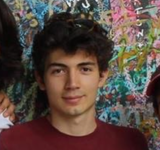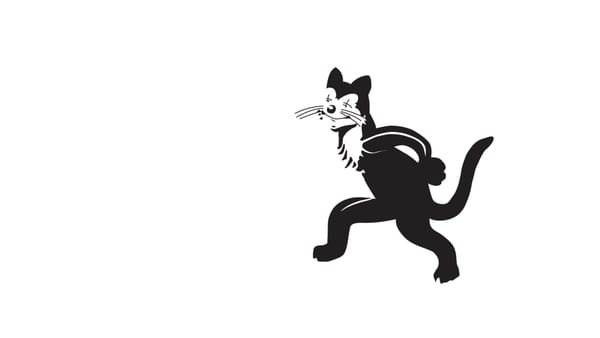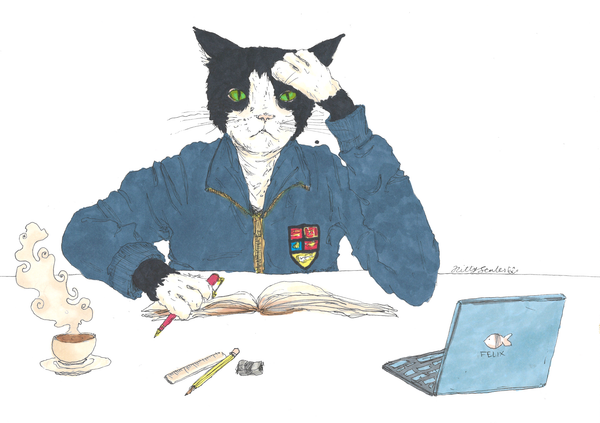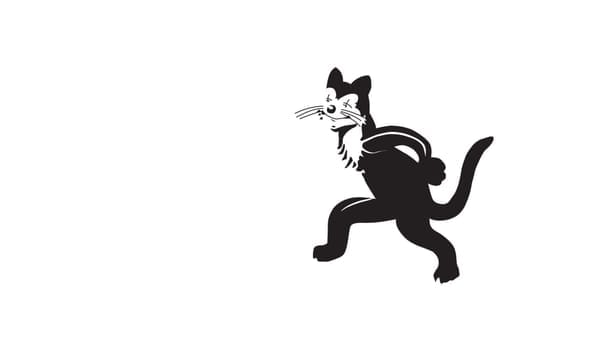A strange investigation, but not an isolated case
Reflections on the Agarthan affair.
This week’s main story is a strange one.
I first saw an Agarthan Society reel on the feed of Felix’s Instagram account. Just as (I believe) most students in this situation, I didn’t think much of it. It was one of the account’s more innocuous posts, featuring mostly pyramids that shot lasers and flying saucers over a sped-up pop song I didn’t recognise. Nothing unexpected on Instagram, especially for a professional account like our newspaper’s which doesn’t give the algorithm much to feed on.
A week later, as I was looking into some of Imperial’s societies, I decided to double-check the account’s name. I had saved the reel, and I could verify that “Agartha” wasn’t an actual honest-to-Union society. However, the questionable logo intrigued me, and alarming discoveries piled up as I browsed the account’s posts.
The Nazi imagery was quite obvious upon a second look, and the comments didn’t leave much doubt as to whether the society’s followers were genuine in their beliefs.
What surprised me and the rest of the Felix newsroom, however, was that the account was followed by many of our friends. It is true that the page’s most popular publications were pretty mild, and nowadays Instagram favours suggested content over subscriptions, meaning the account’s followers might never have come across Nazi uniforms, Black Suns, and SS bolts.
It also made me realise that Instagram’s Overton window has recently widened to encompass some of that imagery. Some memes featuring the fictional Nazi character Hans Landa from Tarantino’s Inglorious Basterds are relatively mainstream on the platform, alongside depictions of New York City mayor-elect Zohran Mamdani as Mao Zedong.
The line between dark humour and veiled support can be a thin one online, especially since making fun of the absurdities of Nazi ideology and the shortcomings of its main figures remains, in my opinion, as good a way as any other to combat the spread of its followers.
This led to a debate in the Felix office over whether Agarthan content was extremist propaganda, or merely obscene irony. In then end, it isn't a journalist's job to speculate on intentions. But even if the people behind this society were multiple degrees of sarcasm above our mortal understanding, would the average viewer understand this? Do the intentions make a difference when, at the end of the day, you risk turning kids into bigots?
Cutting our epistemological reflections short, the Agarthan Society cleared all doubt by creating a hellish discussion group. Felix joined it with neutral accounts that didn’t bear names. Imperial Agartha’s account shared horrific content that I frankly wish I hadn’t spent my weekend scrutinising.
I was also surprised to notice that many Imperial students joined the chat with their personal accounts. Many of them might not have expected extremist content to be shared, and some left early on. But a handful of students merrily sent the most ghastly content on a chat that was open to anyone who clicked the link. The Agarthan Society did reassure its followers with an overconfident “we r leak proof”.
My horror grew when I discovered that not only did “edits” of the Wehrmacht thriving on Instagram without being taken down, but it was also possible to post GIFs of the Kristallnacht in the comment section as a sign of support. Thanks Meta, real cool.
I decided to see what content was suggested to me on the account I had used to look at the antisemitic and racist memes sent on the groupchat. Again, what Instagram had to offer was an endless flow of antisemitic reels, only interrupted by regular reels with antisemitic comments.
It raises serious questions about the role of social media algorithms and AI-generated content in the rise of online extremism.
Editor's note: When the article was published, we expected to give the most proselytising Agarthans a fright... But the reels continued for days.







